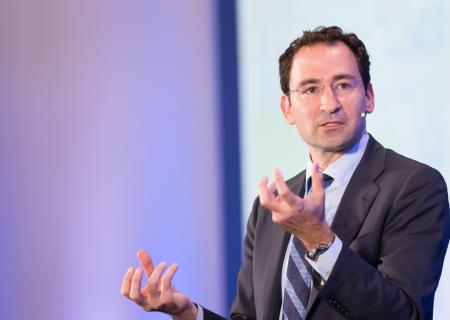Power to the people
Annual Conference Barcelona 2015
Technology may have been a major theme of INREV’s 2015 Annual Conference in Barcelona, but it will be people not gadgets that shape the industry.
INREV's 2015 Annual Conference in Barcelona took in drones, cloud computing, foldaway houses, the Chinese economic miracle and the kids that were sat on the beach across from the landmark Arts Hotel venue.
As summed up by Patrick Kanters, INREV Chairman and Managing Director of Real Estate and Infrastructure at APG, an annual conference with a theme of future trends in real estate featured much discussion of technology and its effects, but crucially, gave an insight into how technological and demographic factors were changing people’s behaviour.
It’s still people that count, and especially our changing behaviours, because this is what impacts the built environment - the type of space we all want to live and work in and how we wish to use it. Patrick Kanters
‘It’s still people that count, and especially our changing behaviours,’ Kanters said in his closing address, ‘because this is what impacts the built environment - that’s to say, the type of space we all want to live and work in and how we wish to use it.’
Delegates - who had travelled to Barcelona from across the globe and comprised a mix of investors and fund managers - were confident about the macro economy and the fortunes of the sector in the near term; less confident about the political climate, and mixed about how well they were responding to the large changes affecting real estate, including technology.
The fact that technology and its impact on the sector would play a key part in the conference, attended by more than 400 people, was evident in the theme, ‘Journeys into space: Future trends for real estate’. The audience was treated to a stellar line up of speakers including Blackstone Head of Real Estate Jon Gray, former Goldman Sachs Chief Economist Jim O’Neill, and Lord George Robertson, former UK Defence Secretary and NATO Secretary General.
And while there was plenty of debate on the specific impact of technology on the sector - from ecommerce, data storage and houses where rooms can be folded away to create new spaces - it was how technology and human behaviour intersect that the real estate industry must examine, the conference heard.
‘Sixty years ago science fiction predicted that we would be travelling to work in flying helicopters - but no one predicted that women would be going to work at all,’ said futurologist and trendspotter Magnus Lindkvist, adding that female participation in the workforce had been a major contributor to boosting GDP in countries like his native Sweden.
Lindkvist said this showed the need to look for ‘vertical change’ in order to make real breakthroughs in any field, be it real estate, business, or society at large. Having too narrow a focus on the effects of one particular technology, especially in the age of globalisation, led to homogenisation and a culture of where R&D stands for ‘’rip off and duplicate’ rather than research and development.
When it came to the specific impact of technology on real estate and how people use it, much of the discussion centred around how it was reducing the amount of space needed, with Bahram Motamedian, Managing Director of Portfolio Management at pension fund USAA Real Estate, pointing to the fact that increased computation power, cloud computing, shared economy companies like Airbnb, and efficiencies in how buildings are built and used were all decreasing the need for traditional real estate.

‘We now need less space for the same amount of information,’ he said. ‘We also require less space to do our work, and residential “microunits” - modular housing where multiple uses fold in and out of spaces - mean we need less space to live.”
While this issue is well known in real estate, answers to a survey question asked of the delegates indicated that it is not something with which it has fully come to terms: 40% responded to a question about whether the real estate sector was optimising it’s use of new technology by answering ‘not at all’; and only a quarter were redesigning their portfolios to take new technology sectors and systems into account.
In terms of which sectors were being most affected, retail and logistics shared the audience’s vote - with 43% each. ‘This certainly reflects APG’s thinking on these two sectors,’ Kanters said.
Another key change that dominated the discussion was urbanisation; as Motamedian pointed out, the 50% of the world’s population living in cities today will grow to 75% by 2050, which will have a huge impact on the way we use real estate.
Blackstone’s Gray argued that technological innovation would continue to increase the pace of urbanisation, and Andrew Allen, Director of Global Property Research at Aberdeen Asset Management, pointed out that the general view of urbanisation as being most prevalent in emerging markets was not the case. Investors, he added, were not always taking advantage of the trend in the best way possible.
‘Rapid urbanisation in Europe’s global cities generates population growth in excess of emerging market averages,’ he said. ‘However offices, a favourite of investors, have not performed well compared to other sectors.’
Robertson shared his perspectives on the geopolitical climate, stating that our world is simultaneously safer and more dangerous than in the past. ‘On one hand, we may be living in the most peaceful era in history,’ he said. ‘However, the world feels less safe because every conflict is being played out in our living rooms through televisions.’
Others speakers looked at the way human behaviour is influencing commercial real estate companies on both a macro and individual level.
China doesn’t exist now to make cheap stuff for the rest of the world, and its relationship to the world will change, and that can benefit real estate. Jim O’Neill'
An impact of recent social, demographic, economic and political forces was highlighted by Jim O’Neill, who was last month appointed as Secretary to the Treasury in the UK government to help cities in the north of the country boost their economy. O’Neill took the delegates out of the conference room and looked at the problems in the Spanish and European economy which were epitomised by what he had seen a 100 meters across the street.
‘I got to here early yesterday, so I went for a run on the beach, which turned into a walk really,’ he said. ‘It was a Tuesday afternoon, but it was so busy it was like a weekend. There is still a huge problem with unemployment among young people, here and across Europe, it’s the biggest challenge facing the whole of the continent. And it’s something that policymakers need to address, rather than just focusing on budget deficit cuts.
‘It’s a long-term issue and difficult to solve, but developing a good education system really is key. There is so much evidence linking better education with better jobs and economic prospects. If you look at the places with the highest youth unemployment then it correlates with places with poorer education systems.’
But on the whole, the man famous for coining the acronym BRICS was positive about a global economy where China will continue to drive growth.
‘What you can see if you look at the figures is that global GDP growth was stronger in the two thousands than in the two previous decades, in spite of the financial crisis,’ he said. ‘And despite the various challenges, world GDP growth should be better again in this decade. That may be why real estate markets continue to do so well. The eurozone is lagging behind what was already a low prediction, so it is a good job that it is starting to pick up now.
‘But the biggest reason the world has done better in the two thousands than in the 80s and 90s, and the reason it is continuing to do well is China,’ he added. ‘People talk about India having a higher rate of growth than China, but even if China grows at 7% over the next few years and India grows at 8%, China will produce three new Indias.”
For O’Neill, the west’s relationship with China has changed fundamentally, and this is presenting a huge opportunity to the real estate industry.
‘China doesn’t exist now to make cheap stuff for the rest of the world, and its relationship to the world will change, and that can benefit real estate. On my last visit there I met a very clever company that has been set up advising Chinese middle class families on where to send their children to university. By the end of the decade there will be 850,000 overseas students leaving China each year.’
In an onstage interview conducted by Johan van der Ende, Senior Advisor with KBR-Finance, Jon Gray advocated how a focus on individuals allowed the company to avoid the pitfalls that can bring a company down when it becomes as huge as Blackstone.
‘We’re always looking to bring in the best and most talented people, but the real challenge is to open up the lanes for them,’ he said. ‘If you do well, work hard and make money for our investors then we will open up for you. We want to operate a hyper meritocracy. Our US acquisitions business is run by two people who are 33 and 34. They are talented people and we wanted to make sure we gave them opportunities.’
There is not a lot of new building going on and that gives me comfort, no excessive consumption and no excessive lending. We’re not at the edge of the next economic downturn. Jon Gray
Alongside O’Neill, the other speakers and the audience in general, he was very positive about the medium term outlook for real estate and the economy.
‘Things aren’t as cheap as three years ago, but a lot of assets are still trading at below replacement costs,’ he said. ‘Some London offices or US apartments seem fully priced, but in general there are still good discounts out there. There is not a lot of new building going on and that gives me comfort, no excessive consumption and no excessive lending. We’re not at the edge of the next economic downturn.’
Reassuring words from the head of the world’s largest property company, which has the best track record of making money over the past decade. If real estate can start to really grasp the benefits and effects of technology, and retain its focus on people, it will be a very good era indeed.







